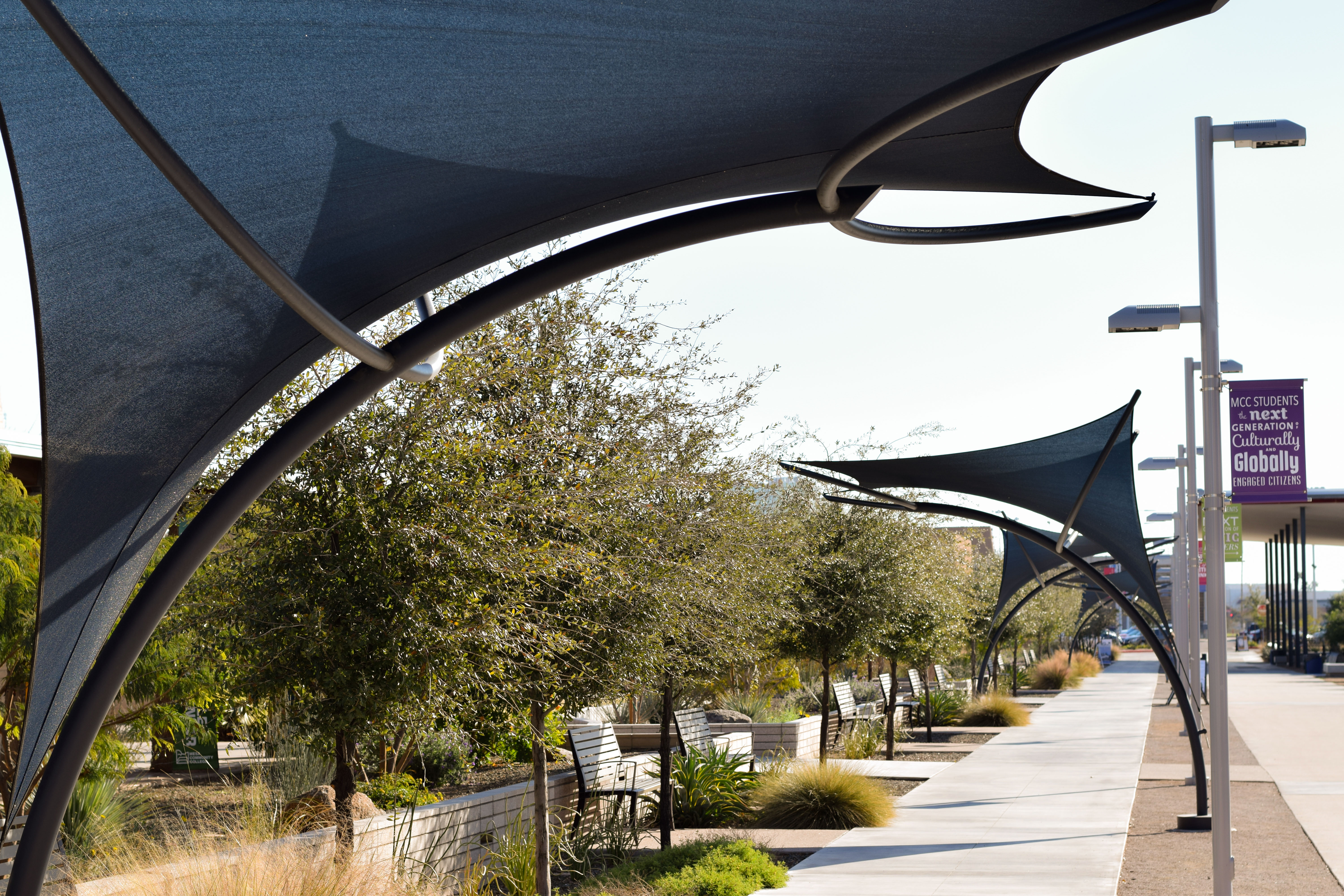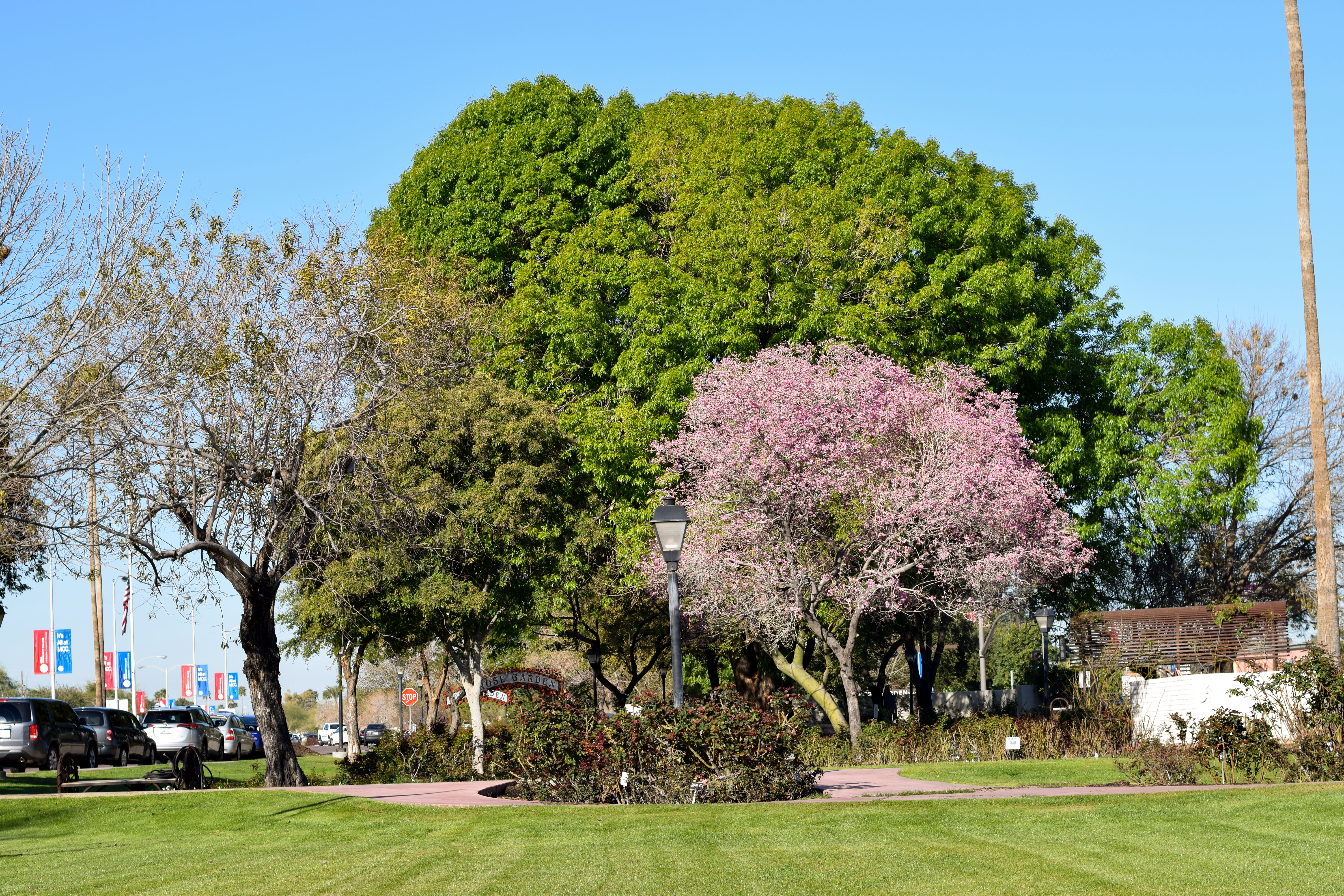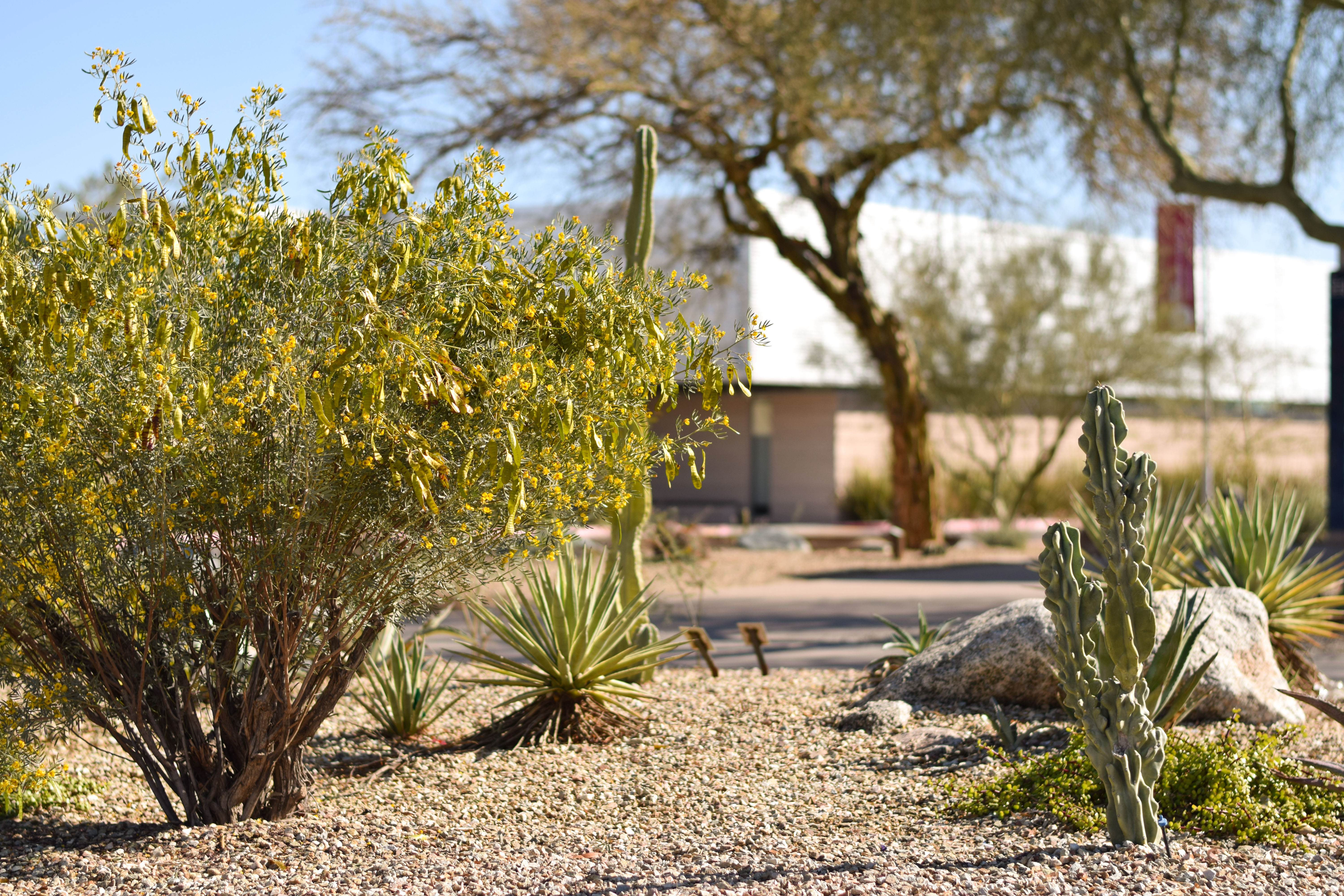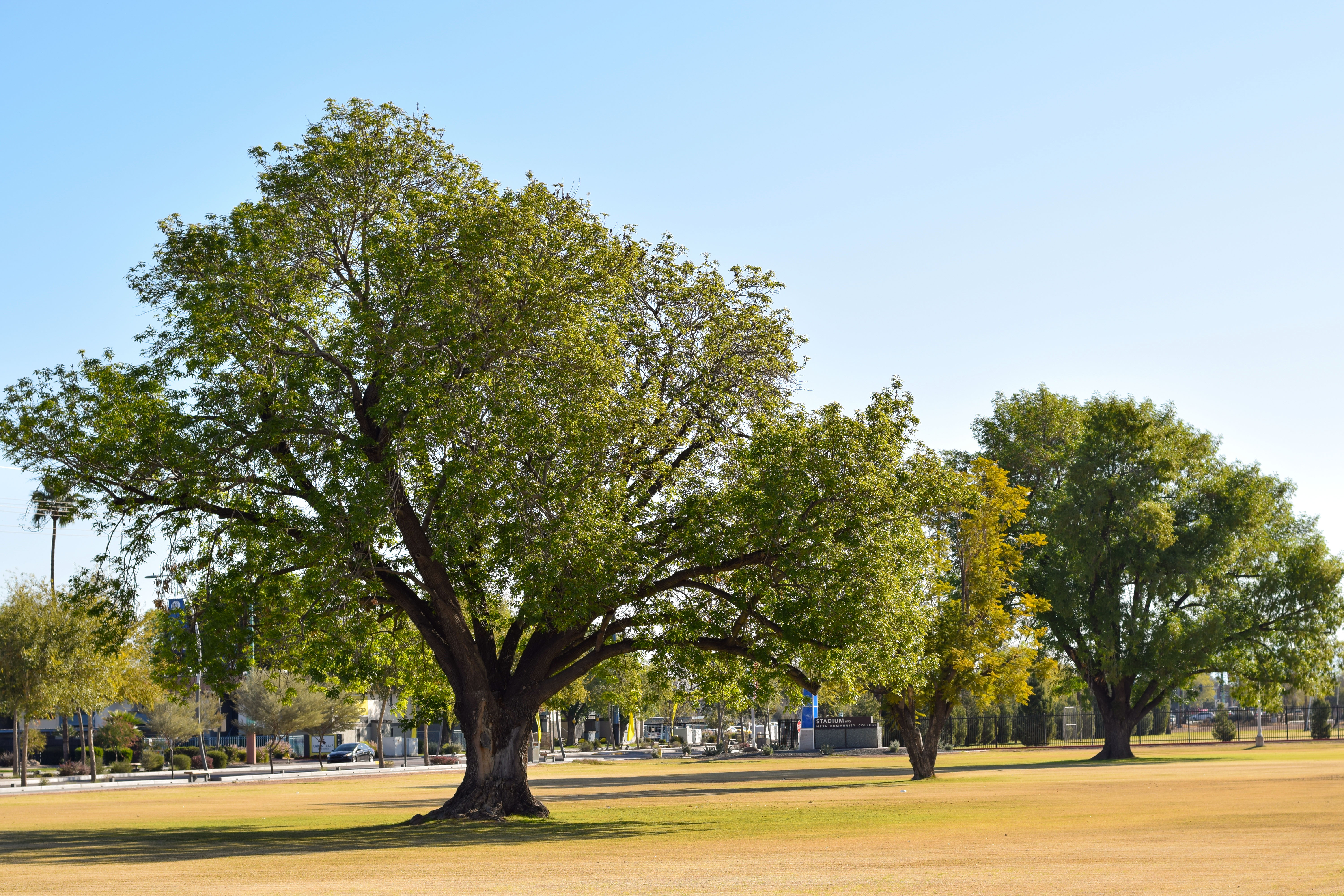Mesa Community College Arboretum honored
 By David M. Brown
By David M. Brown
Mesa Community College (MCC) has grown to become an arboretum. On Arbor Day, April 27, the MCC campus at Southern Avenue and Dobson Road celebrated two green distinctions: becoming the first Level I ArbNet-accredited arboretum in Arizona and also receiving accreditation from The Morton Arboretum for achieving its high standards. A salvaged native velvet mesquite was planted to commemorate the achievement at the college, one of ten comprising the Maricopa County Community College District.
An arboretum showcases trees, shrubs and other woody plants for research, educational, and ornamental purposes and cultivates flora for exhibition. The MCC Arboretum maintains thousands of plants, mostly low-water-use native and desert-adapted trees, but also specimens from around the world with nearly 100 species of trees and 80-plus of cacti and succulents. These include rarities such as the Guyacan (Guaicum coulteri), a small tree from western Mexico which produces small blue flowers each spring that may have anti-diabetic properties. Many species of yucca in the Sonoran and Chihuahuan desert can also be seen.
With these new distinctions, all 150-plus acres at MCC are now classified as an arboretum. This is a similar campus model to examples at ASU and the University of Arizona, says Sean Whitcomb, a graduate student in Plant Biology at ASU, a faculty member in the MCC Life Sciences department, and a member of the Arboretum Advisory Council. “Of course, the Desert Botanical Garden in Phoenix is one of the world’s premier public gardens, and that has also provided inspiration to everyone who has worked on the MCC Arboretum,” explained Whitcomb. “We are honored to be the first college or university arboretum in Arizona to be accredited by any agency and the fourth community college in the country to be accredited.”
He added that the Arboretum at Flagstaff and the Boyce Thompson Arboretum in Superior northeast of the Valley are also accredited but through a different agency.
The ArbNet Arboretum Accreditation Program is an international group of arboreta, sponsored and coordinated by The Morton Arboretum, Lisle, Illinois, with the American Public Gardens Association and Botanic Gardens Conservation International. The Morton Register of Arboreta is a world database of arboreta and gardens dedicated to woody plants.
Level 1 ArbNet accreditation stipulates that at least 25 species or varieties of plants are properly identified and labeled, that the campus schedules at least one public event annually, and that staff has a written plan working for collection and governance.
“The next level requires 100-plus species or varieties,” said Whitcomb, who with faculty associate Steve Priebe and student Tom Bulinski inventoried and labeled the trees. “We’re hoping to achieve that level in the coming years.”
Green Goes the Garden
Sustainability and education are primary goals. Predating the arboretum at MCC is the largest public rose garden in the Southwest. Established in 1989, it displays several thousand plants representing hundreds of rose varieties, some that can be grown with little supplemental watering.
A veterans garden features roses named for all branches of the military, and the garden also trials new roses for survivability in the desert Southwest. For almost 30 years, the garden has been meticulously tended by members of the Mesa-East Valley Rose Society, MCC faculty, staff, students and community volunteers. The arboretum also contains an award-winning four-acre Xeriscape Demonstration Garden, created with the city of Mesa and the U.S. Bureau of Reclamation. This has several varieties of trees, shrubs, and succulents that thrive in desert heat, again, with very little water.
“Although we do have a few legacy areas of campus that rely on flood irrigation and sprinklers, new plantings in the arboretum use efficient drip irrigation to minimize water use,” Whitcomb explained.
Other eco-benefits of the arboretum include helping to reduce the heat island effect and recycling stormwater. A new tool is in the shed at the MCC Urban Farm, part of the Sustainable Agriculture degree program: a tractor attachment that composts green waste from the arboretum for use onsite instead of being hauled to the landfill.

The director of the arboretum, Peter Conden, was asked at his 2010 job interview, “What plans do you have to improve the horticulture program, and the campus in general?”
“My immediate answer was to start an arboretum since the campus covers about 150 acres, has such a diverse plant collection and is home to the only Landscape Horticulture degree program in the Valley,” said Conden, who directs the Sustainable Agriculture and Landscape Horticulture programs at MCC. The arboretum project began promptly two years after he started at MCC in 2012. Four years later, Whitcomb began the process for accreditation as an arboretum.
In addition to its sustainable assets, the arboretum is a living laboratory for Landscape Horticulture and Life Sciences as well as Cultural Science in classes such as biology, horticulture, and art.
Students in Environmental Biology and Plant Growth and Development classes are studying the ecosystem services provided by the 1,200-plus campus trees, including air pollution filtration, carbon storage, property value increase, and shade, Whitcomb explained. “We will use that data to analyze the benefits provided to the college and community and hope to have the project done within the next year,” Whitcomb said.
Roots to the Next Generation
Students have been involved with the project from its seeding. Jovan Coleman, a second-year Horticulture and Sustainability student from Mesa, has been visiting the rose garden and arboretum for years, even before her student days. “In the spring, it’s lovely to walk the rose garden on the way home from work,” Coleman recalled.
Coleman has helped to measure the height and diameter of the trees for several classes, and in the fall she will be logging additional plant data and will serve on the MCC Arboretum Advisory Council. She plans a career combining sustainability and gardening, designing beautiful garden spaces that benefit wildlife as well as the people who visit them.
The public benefits in a number of ways, finding inspiration, respite, and education in these special spaces. “I have never been to the rose garden, for example, without seeing a few people gathered there chatting, drawing or just relaxing,” Coleman said. “I have seen birds nesting in the large trees and butterflies racing from one nectar-rich flower to another.”
The arboretum is accessible during regular school hours, 6 a.m. to 10 p.m. at no charge. And, anyone can take a virtual tour on any computer or mobile device while on campus at mesacc.edu/arboretum. For more information, call 480.461.7117.

Images courtesy Mesa Community College
Brown is an Arizona writer (azwriter.com).







